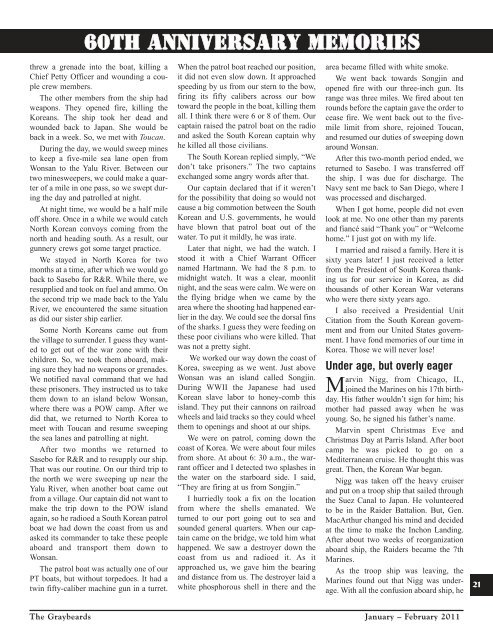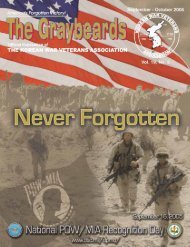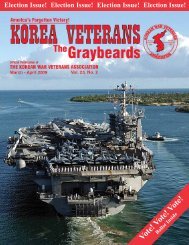gray01 Jan-Feb 2011_Gray01_Jan-Feb 2005.qxd - Korean War ...
gray01 Jan-Feb 2011_Gray01_Jan-Feb 2005.qxd - Korean War ...
gray01 Jan-Feb 2011_Gray01_Jan-Feb 2005.qxd - Korean War ...
You also want an ePaper? Increase the reach of your titles
YUMPU automatically turns print PDFs into web optimized ePapers that Google loves.
60th Anniversary Memories<br />
threw a grenade into the boat, killing a<br />
Chief Petty Officer and wounding a couple<br />
crew members.<br />
The other members from the ship had<br />
weapons. They opened fire, killing the<br />
<strong>Korean</strong>s. The ship took her dead and<br />
wounded back to Japan. She would be<br />
back in a week. So, we met with Toucan.<br />
During the day, we would sweep mines<br />
to keep a five-mile sea lane open from<br />
Wonsan to the Yalu River. Between our<br />
two minesweepers, we could make a quarter<br />
of a mile in one pass, so we swept during<br />
the day and patrolled at night.<br />
At night time, we would be a half mile<br />
off shore. Once in a while we would catch<br />
North <strong>Korean</strong> convoys coming from the<br />
north and heading south. As a result, our<br />
gunnery crews got some target practice.<br />
We stayed in North Korea for two<br />
months at a time, after which we would go<br />
back to Sasebo for R&R. While there, we<br />
resupplied and took on fuel and ammo. On<br />
the second trip we made back to the Yalu<br />
River, we encountered the same situation<br />
as did our sister ship earlier.<br />
Some North <strong>Korean</strong>s came out from<br />
the village to surrender. I guess they wanted<br />
to get out of the war zone with their<br />
children. So, we took them aboard, making<br />
sure they had no weapons or grenades.<br />
We notified naval command that we had<br />
these prisoners. They instructed us to take<br />
them down to an island below Wonsan,<br />
where there was a POW camp. After we<br />
did that, we returned to North Korea to<br />
meet with Toucan and resume sweeping<br />
the sea lanes and patrolling at night.<br />
After two months we returned to<br />
Sasebo for R&R and to resupply our ship.<br />
That was our routine. On our third trip to<br />
the north we were sweeping up near the<br />
Yalu River, when another boat came out<br />
from a village. Our captain did not want to<br />
make the trip down to the POW island<br />
again, so he radioed a South <strong>Korean</strong> patrol<br />
boat we had down the coast from us and<br />
asked its commander to take these people<br />
aboard and transport them down to<br />
Wonsan.<br />
The patrol boat was actually one of our<br />
PT boats, but without torpedoes. It had a<br />
twin fifty-caliber machine gun in a turret.<br />
When the patrol boat reached our position,<br />
it did not even slow down. It approached<br />
speeding by us from our stern to the bow,<br />
firing its fifty calibers across our bow<br />
toward the people in the boat, killing them<br />
all. I think there were 6 or 8 of them. Our<br />
captain raised the patrol boat on the radio<br />
and asked the South <strong>Korean</strong> captain why<br />
he killed all those civilians.<br />
The South <strong>Korean</strong> replied simply, “We<br />
don’t take prisoners.” The two captains<br />
exchanged some angry words after that.<br />
Our captain declared that if it weren’t<br />
for the possibility that doing so would not<br />
cause a big commotion between the South<br />
<strong>Korean</strong> and U.S. governments, he would<br />
have blown that patrol boat out of the<br />
water. To put it mildly, he was irate.<br />
Later that night, we had the watch. I<br />
stood it with a Chief <strong>War</strong>rant Officer<br />
named Hartmann. We had the 8 p.m. to<br />
midnight watch. It was a clear, moonlit<br />
night, and the seas were calm. We were on<br />
the flying bridge when we came by the<br />
area where the shooting had happened earlier<br />
in the day. We could see the dorsal fins<br />
of the sharks. I guess they were feeding on<br />
these poor civilians who were killed. That<br />
was not a pretty sight.<br />
We worked our way down the coast of<br />
Korea, sweeping as we went. Just above<br />
Wonsan was an island called Songjin.<br />
During WWII the Japanese had used<br />
<strong>Korean</strong> slave labor to honey-comb this<br />
island. They put their cannons on railroad<br />
wheels and laid tracks so they could wheel<br />
them to openings and shoot at our ships.<br />
We were on patrol, coming down the<br />
coast of Korea. We were about four miles<br />
from shore. At about 6: 30 a.m., the warrant<br />
officer and I detected two splashes in<br />
the water on the starboard side. I said,<br />
“They are firing at us from Songjin.”<br />
I hurriedly took a fix on the location<br />
from where the shells emanated. We<br />
turned to our port going out to sea and<br />
sounded general quarters. When our captain<br />
came on the bridge, we told him what<br />
happened. We saw a destroyer down the<br />
coast from us and radioed it. As it<br />
approached us, we gave him the bearing<br />
and distance from us. The destroyer laid a<br />
white phosphorous shell in there and the<br />
area became filled with white smoke.<br />
We went back towards Songjin and<br />
opened fire with our three-inch gun. Its<br />
range was three miles. We fired about ten<br />
rounds before the captain gave the order to<br />
cease fire. We went back out to the fivemile<br />
limit from shore, rejoined Toucan,<br />
and resumed our duties of sweeping down<br />
around Wonsan.<br />
After this two-month period ended, we<br />
returned to Sasebo. I was transferred off<br />
the ship. I was due for discharge. The<br />
Navy sent me back to San Diego, where I<br />
was processed and discharged.<br />
When I got home, people did not even<br />
look at me. No one other than my parents<br />
and fiancé said “Thank you” or “Welcome<br />
home.” I just got on with my life.<br />
I married and raised a family. Here it is<br />
sixty years later! I just received a letter<br />
from the President of South Korea thanking<br />
us for our service in Korea, as did<br />
thousands of other <strong>Korean</strong> <strong>War</strong> veterans<br />
who were there sixty years ago.<br />
I also received a Presidential Unit<br />
Citation from the South <strong>Korean</strong> government<br />
and from our United States government.<br />
I have fond memories of our time in<br />
Korea. Those we will never lose!<br />
Under age, but overly eager<br />
Marvin Nigg, from Chicago, IL,<br />
joined the Marines on his 17th birthday.<br />
His father wouldn’t sign for him; his<br />
mother had passed away when he was<br />
young. So, he signed his father’s name.<br />
Marvin spent Christmas Eve and<br />
Christmas Day at Parris Island. After boot<br />
camp he was picked to go on a<br />
Mediterranean cruise. He thought this was<br />
great. Then, the <strong>Korean</strong> <strong>War</strong> began.<br />
Nigg was taken off the heavy cruiser<br />
and put on a troop ship that sailed through<br />
the Suez Canal to Japan. He volunteered<br />
to be in the Raider Battalion. But, Gen.<br />
MacArthur changed his mind and decided<br />
at the time to make the Inchon Landing.<br />
After about two weeks of reorganization<br />
aboard ship, the Raiders became the 7th<br />
Marines.<br />
As the troop ship was leaving, the<br />
Marines found out that Nigg was underage.<br />
With all the confusion aboard ship, he<br />
21<br />
The Graybeards<br />
<strong>Jan</strong>uary – <strong>Feb</strong>ruary <strong>2011</strong>
















